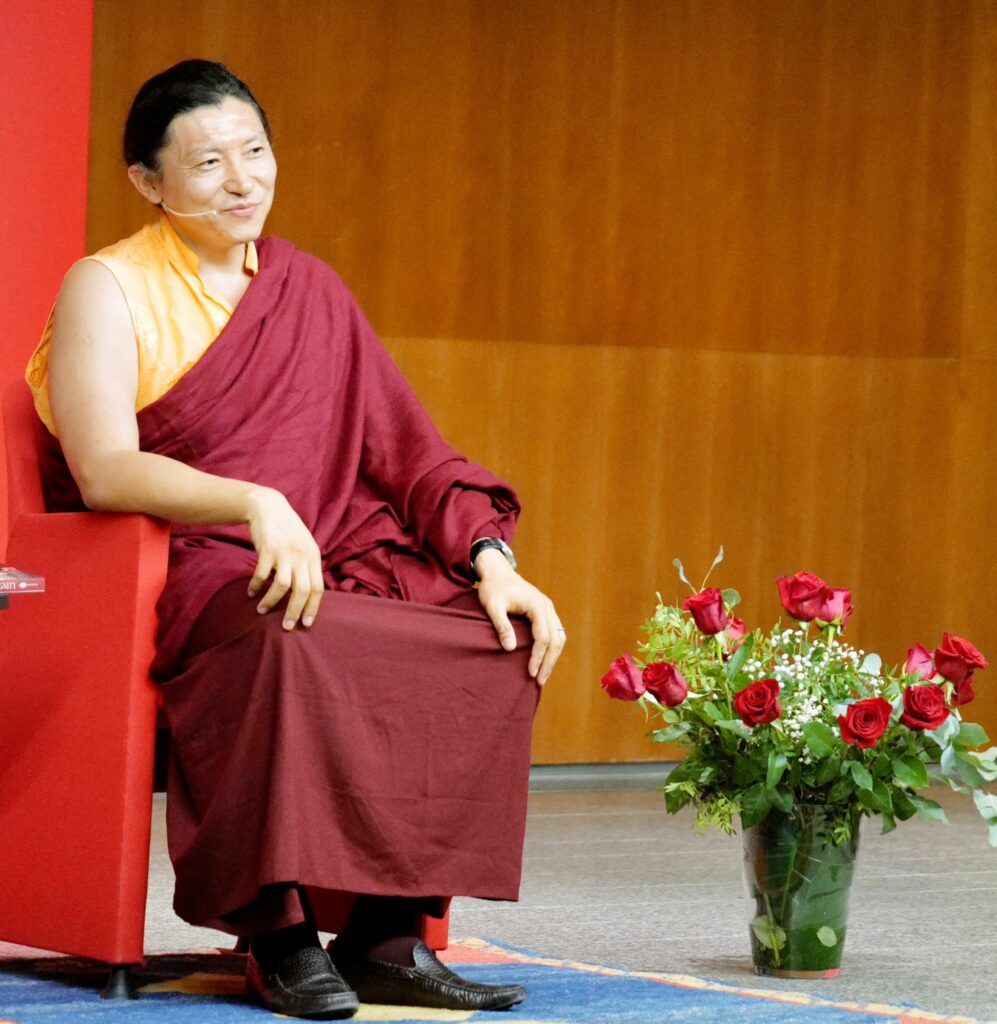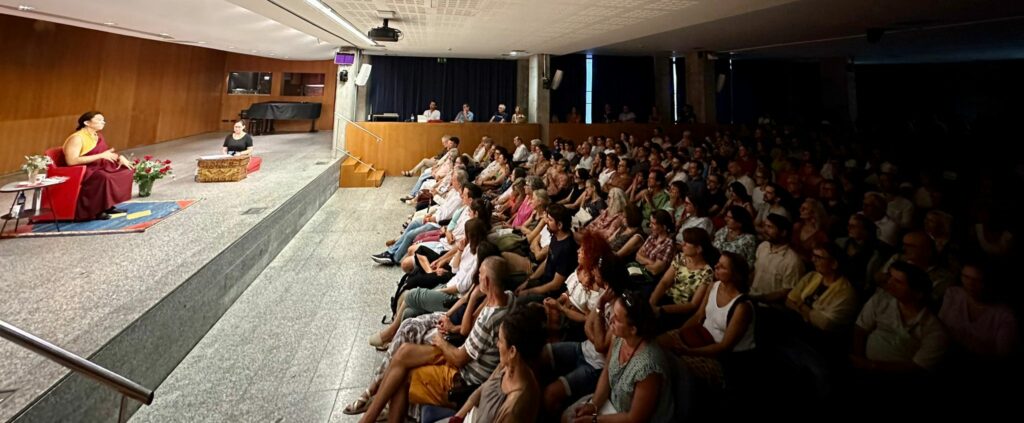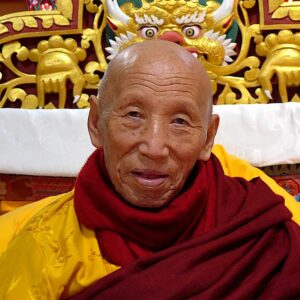Many of us will long remember the evening of Tuesday 5 September 2023: it was the first time
Phakchok Rinpoche visited Barcelona (and Spain) in person. On Tuesday the 5th he gave a
lecture open to the general public in the auditorium of the Pompeu Fabra University (UPF,
Ciutadella building), while on the 6th and 7th he gave teachings for members and friends of
the Association Bodhicitta – Escola de l’Ésser.
The conference at UPF was aimed at presenting Phakchok Rinpoche’s latest book, Awakening
Dignity, and was organised jointly by the Asociación Bodhicitta, Samye Institute and UPF, with
the collaboration of the publishing house Kairós, which will publish the book in Spanish in the
near future.
Raquel Bouso, lecturer at the UPF Faculty of Humanities and specialist on Zen Buddhism,
welcomed the attendees on behalf of UPF, and explained that Phakchok Rinpoche’s lecture
was the first event of the university’s “Aula de Meditació”, an annual programme of
meditation-related activities aimed at the university community.
Phakchok Rinpoche began by saying that he would speak about dignity. He believes that we
know about meditation, about yoga, about self-healing, but not about dignity.
What is dignity? Dignity is not an emotion, it is not a feeling or a sensation. It is not a title that
someone gives us, but it is our authentic nature. Nature of what? Nature of the body, of
speech, of our mind. It is the nature of the one who thinks or feels, pure and innate. Dignity is
not created by me, nor by anyone else, because it is not created, that is why it is nature.
Dignity is the essence of our mind.
We all want calm and tranquillity, unconditional love, to receive it from someone. But we have
forgotten unconditional love and compassion. If we have forgotten how to give unconditional
love, who can receive it?

When we have a day to be quiet, we are unable to remain calm and remain busy, we do not
allow ourselves even a moment of silence, because we are afraid of uncovering our Pandora’s
box.
But Rinpoche gives us good news: there is no Pandora’s box inside us. We call Pandora’s box
the sticky mind, which always attaches itself to something negative, something that affects us
greatly in our daily lives.
If we are told that we have Pandora’s box inside us, full of negative things, we accept it. But if
we are told that our nature is pure, we don’t accept it. When we see that we have a bad habit,
we give it more importance than our nature. We have to reflect without judgement, with
unconditional love. The problem is that we think that the love we receive is not unconditional.
Rinpoche recommends remembering these two ideas: that our mind has a bad habit, that of
attaching itself to certain things (negative or positive); and that our nature is pure, which for
him is dignity.
We do many things to distract ourselves from negative emotions, but we always end up
coming back to the negative. It is a negative habit of our mind. In our mind we always want to
hold on to something, to own something.
When we try to reflect and be calm we think that to be quiet and calm is to do nothing. But we
are doing something: if we don’t judge, if we don’t compare, things open up and we can
experience them as they are.
Rinpoche says he studied philosophy for seven years, and when he was told that his nature
was pure he disagreed. But with practice and time he came to understand. We need to
constantly remind ourselves that our nature is pure.
Meditation is a technique to reconnect with our pure nature. Our nature is peaceful and
compassionate, it has no ego. Our mind, on the other hand, has ego, which is why it is irritable.
Modern science today attaches great importance to mental calmness. Doctors today prescribe
drugs to people, but they also recommend calm and tranquillity, they accept that the mind has
a great influence on the functioning of the body.
We have to help our body to heal itself. When we work with our body, we see that physical
changes can take a minimum of six months to appear and consolidate. But the emotional and
mental practice takes longer, a minimum of two years.
With the mind we also work steadily, every day a little bit, as with the body. We also have to
help our mind to heal itself. Precisely, the training of dignity consists in cleansing our negative
mental habits, in changing our temperament.
Rinpoche compares this process to taming a horse. Always holding the reins and with a whip in
the other hand, within a fence, a confined space (we do not release the horse to run free in the
field). We do the same with the mind: we become familiar with it when we are still and quiet,
and when it is distracted we always bring it back to the point on which we have fixed our
attention.
Instead of looking for unconditional love outside ourselves, we must look for it within
ourselves. When we become still and silent we realise that the source of compassion is in our
heart.
Dignity is the basis of compassion, of happiness, of meditation. Our dignity was not created by
us. We don’t own it and we don’t owe it to anyone. We are not indebted to anyone for having
this dignity. And this is an important point.
One has to become a dignified person. This is a philosophy of life. Even more: it is the nature of
our life.
Besides meditating, we have to reflect. If we reflect, we can make progress. Without judging.
Just noticing, grasping, without emotions. It is judgement that produces emotions.
Rinpoche says that when he attends a conference he always hopes to gain concrete insights. Thus, from the Barcelona conference he proposes that we retain these three ideas:
- The nature of our mind is perfect, it is pure, and we did not create it;
- The difference between noticing and judging is that the latter produces emotions, we know this, but we are not aware of it;
- Before meditating we have to reflect: What do I have to change in my character? We reflect on what we want to change.
Actually we already reflect, but we don’t spend enough time on it. We need to devote more
time to reflection in order to improve ourselves and our environment.
Nowadays we have lost sight of the time needed for things to develop organically,
autonomously. We want everything immediately. Plants take time to grow and bear fruit. So
do personal transformations. We cannot force them, we have to be patient.

Rinpoche explains the no-oxygen technique, very useful in moments of anger, sadness,
loneliness, jealousy: we have to take the air out (from the abdomen) through the mouth, in a
determined way, emptying the lungs completely; we hold our breath for three seconds, and
then we inhale through the nose. Repeat the operation five times. The negative emotion goes
down because we have taken away the oxygen, in the same way that fire is extinguished if we
take away the oxygen. Rinpoche learned this technique of depriving emotions of oxygen from
his master and it is more than a thousand years old.
Therefore, we can take away four things from Rinpoche’s lecture: the three points mentioned
above and also the no-oxygen technique.
After the end of the lecture, six people from the audience put their questions to Rinpoche,
who answered them in full.
Lecturer Raquel Bouso closed the event by thanking the people who had made the lecture
possible. The university welcomed the event very openly and generously from the very
beginning and it is to be hoped that the Asociación Bodhicitta and UPF will collaborate again in
the future.
It was a great joy to see that the 320-seat UPF Auditorium was full, and that the attendees left
the hall with a serene smile on their lips.










Responses